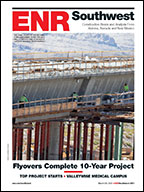Government, industry and labor-union officials on May 11-15 marked the third-annual Infrastructure Week by speaking about the economic importance of highways, rail lines, waterways, ports and other public works at events held around the U.S. But hovering over all the speeches was deep frustration over the lack of progress in Congress on infrastructure advocates' prime goal: a long-term surface-transportation bill.
At the program's May 11 Washington, D.C., kickoff event, attendees heard Vice President Joe Biden declare, "We have to have the most modern infrastructure in the world." But he also noted that federal transportation infrastructure spending was just 1% of the gross domestic product. Biden cited the Obama administration's $478-billion, six-year GROW AMERICA transportation bill as a way to help close the gap, but Congress hasn't endorsed that proposal. The unresolved issue is how to pay for a long-term plan.
Biden asked lawmakers to tell the White House what they would propose. "We will be willing to listen," he said. "I will sit there for hours and compromise to get this done."
After the speech, Gregory Cohen, American Highway Users Alliance president and CEO, told ENR, "What we're hearing, hopefully, is that the administration wants this so bad that they're willing to work with Congress on it and asking Congress for the same in return. Hopefully, this speech will engender a response. I really think that this thing has to be done at the highest levels."
A short-term patch is needed to keep the highway program running past May 31, when its authorization lapses. An extension is expected, but its length is unclear. Brian Pallasch, American Society of Civil Engineers managing director for government relations and infrastructure initiatives, says, "From ASCE's perspective, shorter is better. It keeps Congress' feet to the fire to actually solve the problem in a more long-term fashion." Pallasch says the goal is a five- or six-year bill with higher funding. He adds, "Flat funding is three steps backward."




Post a comment to this article
Report Abusive Comment